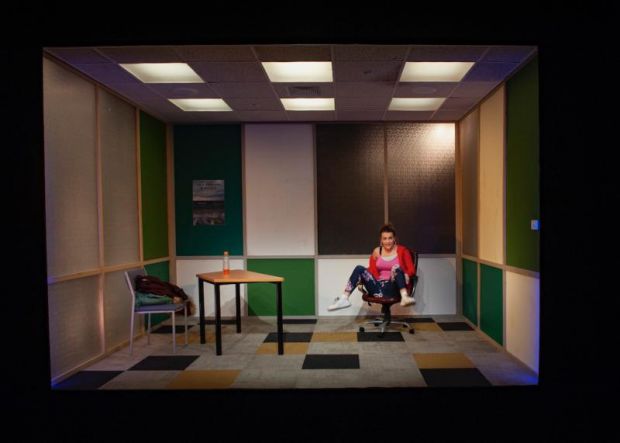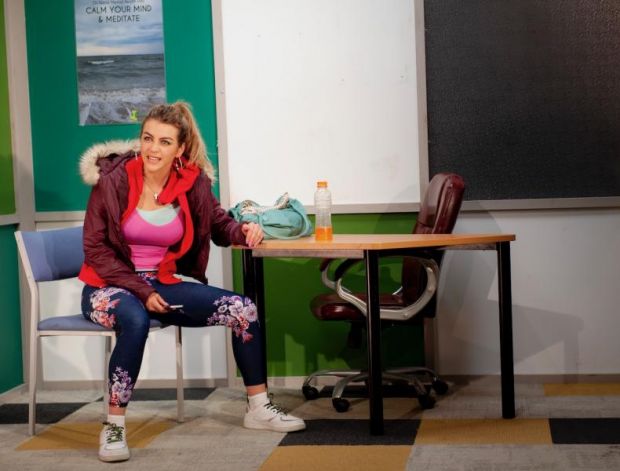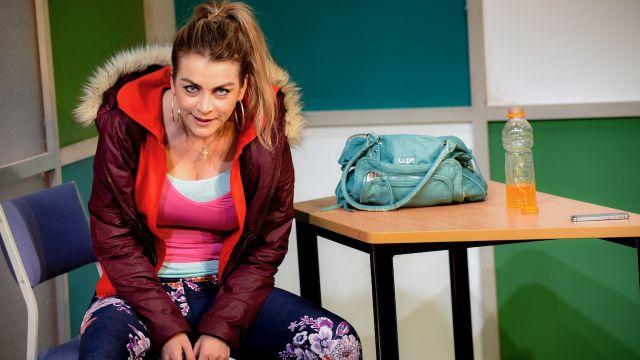Iphigenia in Splott
What Iphigenia in Splott does is tell a gripping story – with a sting in the tail. The story is all the more gripping in its telling here by Jessica Clarke. Alone on stage for close to ninety minutes - and with a Welsh accent too - she gives us a brilliant performance, by turns precise, whimsical, childlike, shocking, and moving.
Ms Clarke’s character ‘Effie’ is a ‘nasty skank’ – that is, she knows that’s how the respectable see her, but for her, it’s almost a badge of pride. Yeah, sure, her life is a round – or a grind - of drugs and alcohol and sex. So what? But Effie wins us over – thanks to Ms Clarke’s portrayal and Gary Owen’s text and director Gary Abraham’s drawing out of the emotions under the text. There’s no self-pity as Effie pointedly confides in us, takes us in with her cheek and defiance, sticking it up the self-righteous, the hypocritical, and the judgemental – and delivered with a gorgeous smile. It’s as if she knows she’ll win us over. But underneath that cheek and defiance we soon sense a desperation, a self-loathing, a smart and tough woman already at a dead end.

She begins and ends sprawled, waiting, waiting, in a bland, austerity government waiting room (design by Jacob Battista and Sophie Woodward) – a limbo of mismatched furniture and unforgiving light (design Rachel Burke). Then, as if she has just noticed our presence, she tells us her story, a story that begins with a demonstration of her everyday sordid life. A bloke she knows shows up with some high class weed, and then they’re high and they’re fucking all afternoon… The telling is as matter of fact as that.
We might withdraw from Effie here, but we don’t because she’s funny and observant, and so we’re laughing and feeling sad for her at the same time. And then, as she tells it, a bit amazed at herself, her story moves to unexpected, touching love and hope… to bitter disappointment… to rage – and then to hope again…

Director Gary Abrahams imbues the telling with expressive physicality on the confined Red Stitch stage, ringing all the story’s changes, its light and shade, in movement and stillness, so that we are swept along with Effie’s tale, carried from a joke to wonder to tenderness and back again.
Ms Clarke has us leaning forward, caring about this ‘nasty skank’, hanging on her every word. It is – to employ an overused term – a visceral experience. At the end, audience hearts are pounding; they are wrung out, shaking. Women identify with Effie; men are enraged for her. Effie’s personal story is so emotionally powerful that it almost overwhelms the political point Gary Owen makes with this story.

And the political point is why the play is called Iphigenia in Splott. Splott is a ‘disadvantaged area’ of Cardiff. Iphigenia, in classical mythology, was the daughter of Agamemnon, sacrificed to the goddess Artemis so that the Greek fleet could sail and lay siege to Troy. So, Effie’s story is, in its way, an allegory, a woman sacrificed to male purpose and ambition. It is set in the streets of Splott where the British government’s utter policy failure of ‘austerity’ sacrifices people like Effie. Her personal story reveals to her (and us) its context. In Splott, a microcosm of Britain of course, there are cuts to the NHS, the municipal pool is gone, the library is closed, half the shops are empty. The murder of Iphigenia had, in the end, the horrific consequences of revenge. And Effie wonders – and so do we – when revenge might come.
Michael Brindley
Photographer: Jodie Hutchinson
Subscribe to our E-Newsletter, buy our latest print edition or find a Performing Arts book at Book Nook.

